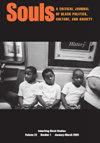Resituating the Crossroads: Theoretical Innovations in Black Feminist Ethnography
IF 0.1
4区 哲学
Q4 ETHNIC STUDIES
引用次数: 2
Abstract
Inspired by the seminal Black Feminist Anthropology volume edited by Irma McClaurin, I examine how Black feminist ethnographies have theorized intersectionality or what the Combahee River Collective called the “simultaneity” and “interlocking” of oppressions. One overlooked theoretical contribution by Black feminist ethnography in terms of analyzing race, class, and gender is the conception of the simultaneity of conjuncture and disjuncture. Given the location of the ethnographers’ positionalities and “fields” within the African Diaspora, I suggest that the coexistence of conjuncture and disjuncture emerges from a diasporic heuristic of “crossroads,” signifying more complexity than the metaphor of intersection.告别十字路口:黑人女性人种学的理论创新
受Irma McClaurin编辑的开创性的《黑人女权主义人类学》一书的启发,我研究了黑人女权主义民族志是如何将交叉性或Combahee River Collective所称的压迫的“同时性”和“连锁性”理论化的。黑人女权主义民族志在分析种族、阶级和性别方面的一个被忽视的理论贡献是连接和分离的同时性概念。考虑到民族志学家的立场和“领域”在非洲散居地中的位置,我认为连接和分离的共存源于“十字路口”的散居启发,意味着比交叉隐喻更复杂。
本文章由计算机程序翻译,如有差异,请以英文原文为准。
求助全文
约1分钟内获得全文
求助全文

 求助内容:
求助内容: 应助结果提醒方式:
应助结果提醒方式:


